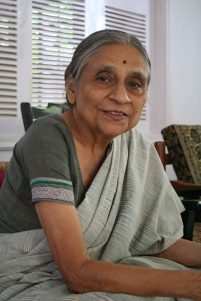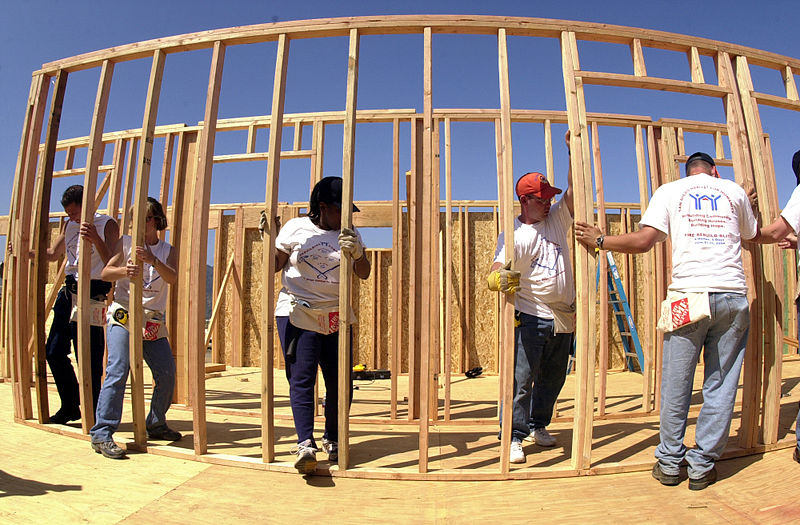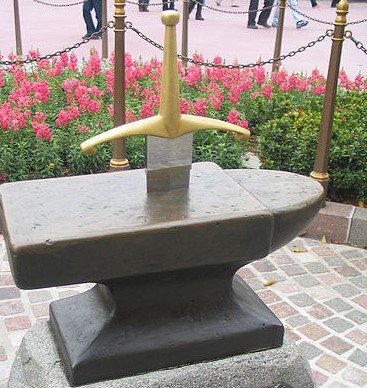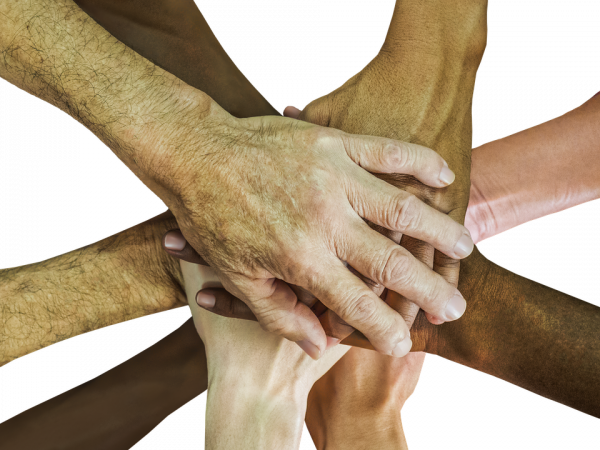Impact of an Idealist: Ela Bhatt
Article By Manjula Nanavati
 One could attempt to describe Ela Bhatt with adjectives: soft-spoken, tenacious, compassionate, dedicated, principled, self-effacing. Or one could use nouns: lawyer, labor-leader, social activist, banker, author, philanthropist. But all these words together still do not comprehensively encompass her visionary foresight, her inexhaustible energy, her unbending strength of purpose, and her unswerving commitment to the humane.
One could attempt to describe Ela Bhatt with adjectives: soft-spoken, tenacious, compassionate, dedicated, principled, self-effacing. Or one could use nouns: lawyer, labor-leader, social activist, banker, author, philanthropist. But all these words together still do not comprehensively encompass her visionary foresight, her inexhaustible energy, her unbending strength of purpose, and her unswerving commitment to the humane.
Ela ben was born in Ahmadabad (India), and after training as a lawyer, she joined the legal department of the Textile Labor Association (TLA) and rose to head its Women’s Wing at the age of 35. Ela ben saw first-hand that these women were forced to supplement their income by weaving, stitching, rolling cigarettes, selling fruits, etc. Since the law didn’t protect women who worked from home, they were routinely oppressed by money-lenders, employers and officials. Ela ben’s sphere of interaction increased to a group of migrant women working as cart-pullers, as well as women head-loaders who carried cloth merchandise to retail markets. Sitting with them on the steps of the warehouse, she listened to their tales of erratic wages, housing problems and exploitation. She knew that something had to be done.
In December 1971, at a meeting held in a public park, the Self-Employed Women’s Association (SEWA) was born, to organize women working in the informal sector, so as to use their collective strength to fight poverty. Ela ben served as its general secretary for the next 25 years, overseeing its growth to almost 2 million members across India, while having also expanded to Sri Lanka, Afghanistan, Nepal, Bhutan, Bangladesh and Pakistan.
One of the early goals of SEWA was to financially help members to release them from the vicious cycle of debt and extortion. Due to illiteracy, formal banking facilities were out of reach. Banks required complex paperwork and were unable to sanction credit without sufficient collateral. “We may be poor, but we are so many. Why don’t we start a bank of our own, where we are treated with the respect and service we deserve?” So started the Mahila Sewa Co-operative Bank, with 4000 women contributing Rs. 10 each. Its goal was to provide small loans and financial counseling to women, and to help them set up their own small businesses. Today the bank has achieved complete financial viability and SEWA has extended its services to include healthcare, childcare, insurance, housing and legal aid… all geared towards women’s empowerment, and independence.
In 1979 Ela ben became Co-founder and chairperson of Women’s World Banking, an international microfinance organization established to investigate the conditions of poor women workers. In 1988 she was appointed to the Rajya Sabha where she chaired the National Commission on Self-Employed Women. In 2007 at the age of 74, Ela ben was invited by Nelson Mandela to join The Elders, a group of 12 international social activists, including past presidents, prime-ministers and Nobel Peace Laureates, with a mission is to promote human rights and world peace.
Growing up during the freedom struggle, Ela ben had been greatly influenced by Mahatma Gandhi. Indeed, SEWA was founded on the Gandhian Principles of Satya (Truth), Ahimsa (Non-violence), and Sarvadharma (inter-faith Integration). “There is no place for hate in our struggle,” she says. “Nurturance comes naturally to human beings while exploitation is learnt behavior. I plead for building an economy of nurturance.”
Former US Secretary of State Hilary Clinton identified Ela Bhatt as one of her personal heroes, and honored her with the Global Fairness Initiative Award for helping more than a million poor women in India to a position of dignity and independence.
Ela ben holds honorary doctoral degrees from Harvard, Yale and Georgetown Universities. And she was awarded the Padma Shri and the Padma Bhushan, India’s highest civilian honors.
Notwithstanding an agenda that could easily have filled far more than one lifetime, Ela ben has also found time to write 2 books: We are poor but so many: The Story of Self-Employed Women in India (2005) and Anubandh: Building Hundred-mile Communities (2015).
Ultimately, Ela Bhatt could perhaps be most accurately described not by nouns or adjectives, but by oxymorons: A pragmatic idealist, a living legend, a gentle revolutionary, a reticent trail-blazer. While her manner and parlance may be as subdued as a whisper, her accomplishments have had a powerful and resounding impact on millions of lives around the world. Her own life is proof that the face of extreme destitution can indeed be transformed, through compassion, selflessness and determination. Our time here may be limited, but if we use it well, it is more than enough.
We had the privilege of being able to ask Ela ben a few questions. Below are edited excerpts of our conversation.
THE ACROPOLITAN (TA): Your life’s work has been to give women protection and dignity in a male dominated society. In what way would you define masculine and feminine roles to build harmonious communities?
ELA BHATT: When I refer to a male dominated society, I do not mean that all males are dominating, all the time. There are males in our homes that do facilitate women’s growth. There are males who are dominating as a husband, but not as a father. Or they may dominate as an engineer, but not as a gardener.
Having said so, I have underlined the need for a partnership between men and women. So you may ask, why then an all woman’s bank and woman-only cooperatives of SEWA? My reply is that for a good partnership both partners have to be in many ways equal and mutual. And that is not possible if one partner is weak in any way. So we began to build women’s strength and skills, not against men, but as themselves, and as partners to men, to build mutual solidarity.
Work per se has no gender. And gender per se is no virtue. Planting trees is good work. Cutting trees is less so. Women teachers are welcome. Women terrorists are not.
However, what I mean to stress is the ‘feminine way’. Let me elaborate.
By this, I do not mean to exclude men from the equation, or assert that women have all the answers. Instead, I refer to a feminine way of thinking, which is often latently present in men too; this has to be celebrated, encouraged and nourished.
Is the feminine way relevant for the future of society? I often ask this question to myself because SEWA represents the feminine. Closely linked to Nature, the feminine task is to hold, to be a catalyst that will allow people and groups to grow. The feminine way has no goals, but rather values the process of unfolding, and learns from it. The feminine has a different sense of time; the work will take whatever time is needed. And SEWA has taken over thirty years to reach a million women. It took 40 years to reach today’s 1.9 million membership in SEWA. The feminine way looks at the whole group and tries to include the whole, waiting for those left behind; even if it means delaying the group, or the process. The goals are collective; the focus is on the progress of the community rather than the individual. I have observed over the years that the feminine way focuses on inclusion instead of domination, on process rather than end-goal, group over individual, and integration over fragmentation.
For me Gandhi’s way in many ways is a feminine way, deeply rooted in simplicity, non-violence, dignity, and human values, which are relevant to our world today more than ever before. Gandhi ji had often acknowledged the lessons he learnt from women, particularly on simplicity; simplicity as a lifestyle guarantees the availability for the other. I feel we have to emulate this philosophy by looking for simple, easily understandable, practical and participative solutions to complex problems — that is the feminine way.
TA: Few people dare to step out of their own comfort zone in the face of systemic injustice. What was the inspiration behind your abundant altruism?
Ela ben: ‘Dare’ is not the right word. Not that we were afraid, but our approach is different. In most cases, we remain inside us, within our own context, and our own circumstances. Even as part of the middle class, where food, shelter, and education are taken care of, we still do not dare to step out. Or maybe we take a little step or two, but not far enough.
After independence in 1947, when we were stepping out of childhood and into youth, we wanted to step out, walk away, or even run, to build a free India that was fair to all and strive for economic freedom as citizens. The freedom struggle built thus needs to step out and reach out. Gandhiji showed the way to do it. We need to do what we can. And we can do a lot.
What is altruism? I do not know. In SEWA, we did what was good for us and good for others. We created jobs, did not take away jobs. We prospered, but by cooperating and not conflicting.
TA: The concept of an ELDER, not just in terms of age, but also as a treasure-trove of experience and wisdom, is a time-honored ancient tradition. Can you tell us about your experience as a founding member of Nelson Mandela’s THE ELDERS?
Ela ben: What an honour to meet and work with such leaders of our times! One learns a lot about many views, global forces, and the human capacity to make simple matters most complex. One learned: what is knowledge and what is wisdom, what is idea and what is action, and where each of these have their rightful place, and what are the limits of knowledge, wisdom, idea or action.
In working with the Elders, their humility made me humble. And I learned even more the value of the power of poor people.
I have seen and worked with poor women who have endless confidence in their wisdom and actions. The Elders enabled me see that the wisdom and action of poor women is universal, and cuts across cultures and crises and continents. I have seen and met the poor worldwide and I come to a sad conclusion: the poor in the world are not poor because they lack this or that, but because we as a society have decided to keep them poor. It is not that we don’t know of solutions. We know all the means, ways, ideas, to enable the poor to come out of poverty. In fact, the poor themselves try to come out of their poverty all the time, and in all possible ways. But we push them back knowingly, or by overlooking them.
TA: What is it then that society must do to inspire each person to become other-centric?
Ela ben: We cannot be “other centric” unless we are “me-centric”. We know what we want, like, and wish for. But most of it is shaped by family, friends, schools and society and even more by what we see on TV or social media. And this is welcome, as one of the many sources. But this cannot determine our sense of “me”. We can better define our sense of me with new experiences, by reflecting on our actions, and the impact it has on us, our society, and Mother Nature. If we think more about us, we will find the others in us.
Once we find us we can find others and reach out. Each one of us has a special call, inspiration, or a unique idea. By nature we all are equal, but we are also different and distinct. We know this truth since our childhood. This inner voice has to be listened to, and respected, and reflected upon.
TA: Your book Anubandh: Building 100-mile Communities urges us to meet life’s basic needs with goods and services produced no more than a hundred miles from where we live. Can you tell us why you consider it critical that the link between humans and their surroundings be restored?
Ela ben: When I say 100 miles in my book, I refer to the notion of 100 miles. It can be 60 or 30 miles in some cases, and 300 or 600 miles in others. My main point in the book is to become better connected to what is “near” us, “next” to us; resulting in less carbon and water footprint due to long distances.
We need to be mindful of what we use, where it comes from, and what we spend. Does it come from a small farmer or a home-based fruit grower on the riverbed? Or does it come from a corporate farm or orchard in some distant location? And where does our money go? To the vegetable vendor on the street, or the big Corporation that runs 1000 grocery stores countrywide?
The reason we have to be mindful of these distances is that we are not only destroying the physical geography of rivers, forests, lakes and mountains, but also the human geography of producers and consumers, the social geography of neighbourhoods, and the economic geography of local markets and skills.
In my book I have suggested the need to be aware of the impact of our actions on us, on our society, on our environment and on our ecosystem. If we destroy these ecosystems, we destroy ourselves as individuals, and as a human race, and as future generations. There is no reason to do so. Because as individuals, as a race, and as future generations, we have a lot to offer; far more than we have offered in the past million years, in order to move towards a creative society, a great civilization. I see this potential on daily basis.
Today money is becoming more and more central in all we do. If this is the case, let money not determine what we do, or how we live. Instead, let us decide how we spend our money to do what we want, and live as we wish. In a highly monetized economy where everything, even a breath of fresh air, has a price, let us be in control of our money, rather than money be in control of us.
Image Credits: Photo courtesy Ela Bhatt
The entity posting this article assumes the responsibility that images used in this article have the requisite permissionsImage References
Photo courtesy Ela Bhatt
Permissions required for the publishing of this article have been obtained




What do you think?